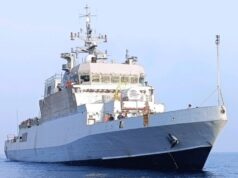DISCONTENT IN INDIAN ARMED FORCES
Jaago Modi, Jaago!
Pushing Them Too Much Not In National Interest (and, Do Not Forget They Are Heavily Armed Men Who Do Not Fear Death)
by Air Marshal R. S. Bedi (retd)
A few decades ago a senior former bureaucrat wrote in his book that it was not possible for the Armed Forces to stage a coup in India. The argument was simply based on the fact that Indian society was a complex body comprising different castes, religions, languages and ethnicities.
No General, however popular, could be sure of the total loyalty and backing of so diverse a force as the Indian Armed Forces. He was perhaps right. Despite this, the fear in the corridors of power continued to persist, for many a fledgling democracy was falling prey to ambitions of men in uniform. There lay the genesis of the process of downsizing and subordinating the Indian Armed Forces.
At present, the state of affairs in the Armed Forces is somewhat disturbing.
• The cumulative effect of years of neglect of the Armed Forces has begun to manifest. Today’s soldier is educated, conscious of his status and standing. His aspirations are growing with the fast-changing environment around him. This, perhaps, is the main reason for repeated incidents of indiscipline in the Army.
• The men were never so verbose and openly daring as they are now in expressing their dissatisfaction. The palpable resentment of the mass of the Armed Forces against the government doesn’t augur well for the future.
Year after year, the Armed Forces have been given a raw deal. They are downgraded with regular periodicity and denuded of power due to them. Enough has been said about their dwindling status. Even the paramilitary forces seem to be overtaking them in many respects.
• The bureaucracy has tightened its grip to the extent that orders from the highest in the government establishment are either diluted or not implemented in proper spirit.
Realising deep discontent in the Armed Forces in regard to the Sixth Pay Commission award, the Prime Minister ordered a high-powered committee to look into the Armed Forces’ grievances. The bureaucracy got away with impunity without delivering. The problem continues to simmer. There is mounting discontentment over the government’s inability to set things right. The political leadership that should, in fact, be the epicentre of power is gradually becoming ineffective.
The retired community, less shackled with rules and regulations, is far more verbose and has even resorted to rallies and dharnas to express their dissatisfaction. They surrendered their hard-earned medals to their Commander-in-Chief to protest against the step-motherly treatment meted out to them. The president showed scant regard for this desperate act of the soldiers.
• Surprisingly, even the paramilitary forces are better placed and better looked after by their Home Ministry than the Armed Forces by their Defence Ministry. In the case of the latter, the Services first struggle with their own ministry to get past it to secure government approval for anything that it needs. The reason not generally known for the paramilitary forces to be under the Home Ministry instead of the Defence Ministry in itself assures them somewhat better treatment.
• They don’t have to fight with their own ministry as do the Armed Forces.
The Armed Forces are not in any major decision-making loop, not even in regard to national security.
This is when the country is on the verge of completing its nuclear triad and acquiring strategic weapons. Presently, no uniformed personnel serve in the Ministry of Defence despite the recommendations made by various committees in the past to make decision-making more informed and rational. Many a committee, including the one on Kargil, has made such recommendations but none has been implemented by the all-powerful bureaucracy.
It’s a pity that despite the highly specialised staff available at the Services headquarters, the political establishment relies totally on the (inept self-serving) Ministry of Defence civil servants drawn from diverse backgrounds. Since the Services have a limited access to the political establishment, they are unable to make any worthwhile contribution to matters of national importance. The Chiefs can hardly meet the Prime Minister. Meeting the Defence Minister is not a routine affair either.
The plight of the soldier has not moved the conscience of the government.
He is taken for granted and tasked to perform what his civilian compatriots prefer not to do or perhaps consider it too dangerous to stake their lives.
• He is killed almost every day which is just a matter of statistics for the government. Only his family sheds tears for they will have to struggle for the rest of their lives; first with the bureaucracy to get what is due to them and then try to subsist with growing responsibilities and scarce resources. His status and emoluments are perhaps among the lowest in the government hierarchy. Yet he does not come out in the streets to protest.
• But now the discontentment is no more confined to whispers. It is getting louder by the day. Questions are asked but unfortunately the answers are not forthcoming. How long will the mandarins in the North and South Blocks ignore the writing on the wall?
The military leadership has been sounding the government at various levels but to no avail. In a rare display of political magnanimity, the Defence Minister wrote to the Prime Minister a couple of months ago with an implicit warning in regard to the deteriorating state of affairs in the Armed Forces. The Prime Minister acted ‘promptly’ and asked the bureaucracy, the same people who are largely responsible for creating the mess, to look into it.
The bureaucrats, as is their wont, refused to include representatives from the Armed Forces whose problems they are supposed to resolve. Obviously, one doesn’t expect much from them in the absence of their voice being heard directly. In the end, some cosmetic changes will be brought about, but the problem will linger on.
TODAY’S INDIAN ARMY IS NO MORE THE SAME AS IT WAS A DECADE AGO. TO TAKE THEM FOR GRANTED WITHOUT RESPONDING TO THEIR GENUINE NEEDS WOULD BE A SERIOUS MISTAKE.
• They are no more reticent and subdued. At least, three cases have been reported in the recent past of revolts against officers. It may be the tip of the iceberg. In any case, it is a reflection of deteriorating standards and morale of men in uniform. Whatever be the reasons for dissatisfaction—pay, pension, food, facilities or status—once the intensity of feelings reaches the critical stage, the consequences may be serious.
The naval mutiny in 1946 was led by signalman M. S. Khan and Telegraphist Madan Singh as a strike in protest against the general conditions of service, inadequate facilities and poor quality of food. The revolt spread fast throughout British India from Karachi to Calcutta and ultimately came to involve nearly 20,000 sailors on 78 ships and 20 shore establishments.
So was the 1857 Mutiny inspired by an ordinary soldier called Pandey in Meerut that soon escalated into other mutinies and civilian rebellions.
The Indian Air Force too was gradually sucked in the naval strike. And so was the Indian Army. The NCOs defied the orders from their British superiors. In Madras and Poona, the British garrison faced a revolt in the ranks of the Indian Army. In fact, widespread rioting took place from Calcutta to Karachi.
Even the British Air Force revolted against the conditions of service in January 1946. The mutiny began in Karachi and spread to 60 RAF stations in India, Ceylon and Singapore. Lord Wavel, then Viceroy of India, stated that the action of the British airmen inspired both Indian Navy and Air Force mutinies. Revolts and rebellions are not necessarily led by the officer class; in fact, often by men whose only concern is their conditions of service and welfare.
• • Today the discontent is far more pronounced than ever before. Whether it is the lackadaisical attitude of the government or a wilful decision is hard to say.
BUT IT WOULD BE A GROSS MISTAKE TO IGNORE THE WRITING ON THE WALL AND THE LESSONS OF HISTORY SO SOON.
Courtesy:Facebook Post By Col.Mahip Chadha.





